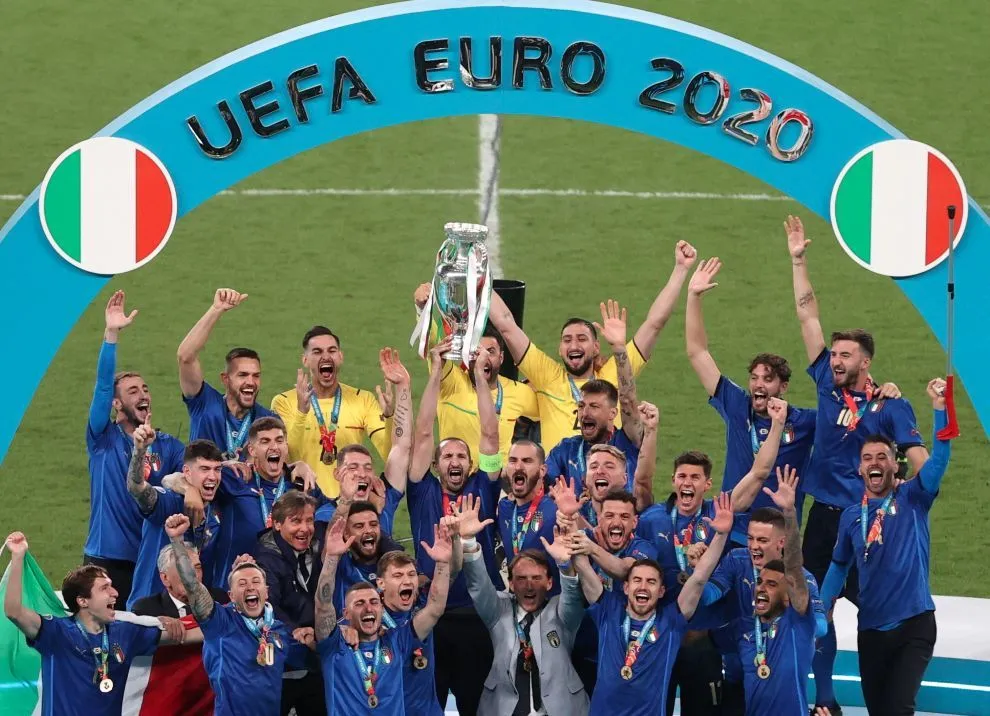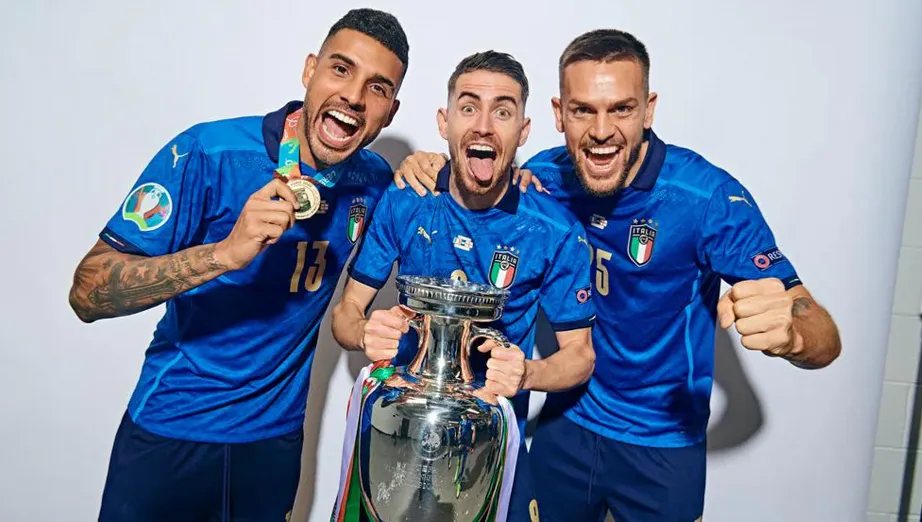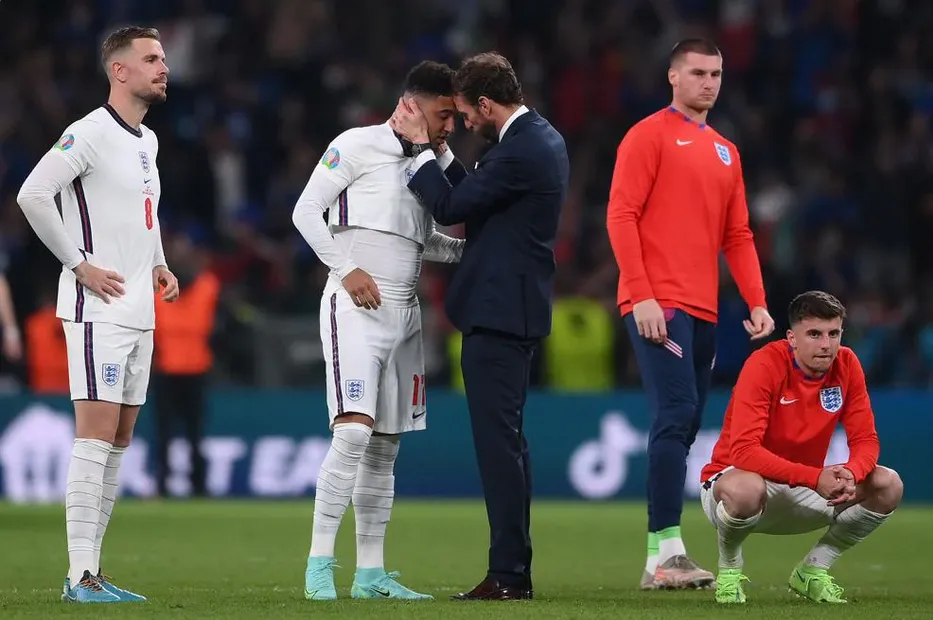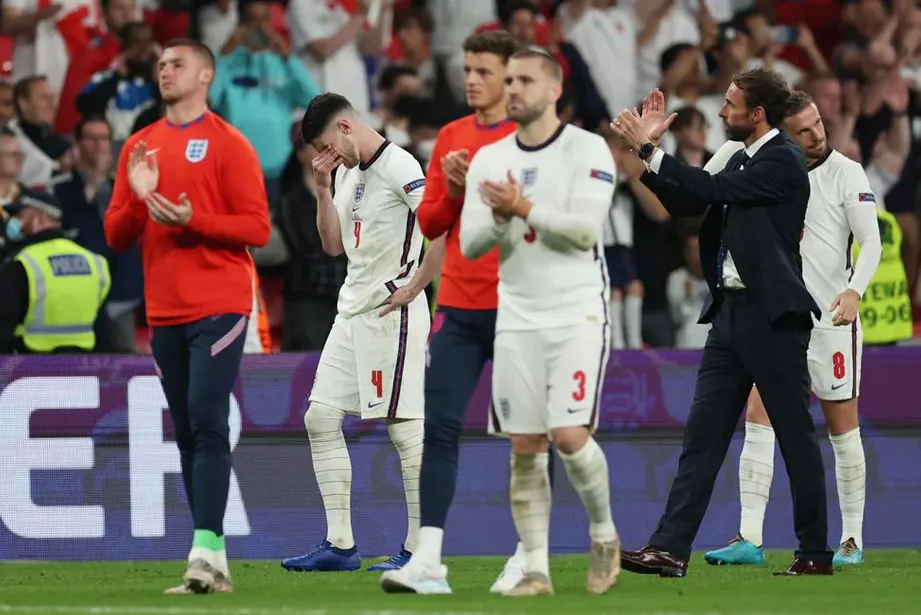
Necesitó más de medio siglo Italia para volver a gritar campeón de la Eurocopa.
Apenas creada la Eurocopa allá por el año 1960 ya en su tercera edición en 1969 Italia gritaba campeón en su tercera edición derrotando en la final a Yugoslavia en un doble partido.
Desde ese momento y salvo dos esporádicos subcampeonatos en 2010 y 2012 la "azzurra" no había podido repetir nunca ni reverdecer viejos laureles.
Pero esta edición, postergada inicialmente en el 2020 y concretada finalmente en el 2021 con un formato especial jugándose en varios estadios de Europa, fue un augurio de buena suerte para el equipo de Mancini.
Un equipo distinto. Un seleccionado italiano "distinto" parea entendenernos. Con una filosofía de fútbol distinta sobretodo para aquellos jóvenes que no recuerdan demasiado como jugaba Italia antes del 2000.
Fútbol defensivo, "catenaccio" puro. La palabra "catenaccio" deriva de "catena" y el objetivo era ese. Un equipo que era una cadena cuyos eslabones estaban tan bien soldados que no se rompían nunca. Esos eslabones eran el mediocampo y la defensa férreamente unidos. Y arriba, bien arriba, los "pescadores" de balones con un elevado sentido oportunístico del gol. Italia siempre tuvo un "Totò" Schillacci, Filippo Inzaghi, Gianluca Vialli, Roberto Bettega. Luca Tonia y otros alfiles que parecían tener un imán paratraer el balón y meterlo en el arco. Hasta de rebote.
De esa manera Italia ganó muchos títulos. A nivel de equipos y de selección. Pero nunca terminó conveciendo del todo salvo esporádicos casos como el Milan de Arrigo Sacchi.
Hasta que, a partir del año 2000 comenzó a cambiar. Una selección integrada por italianos de "pura cepa" se fue integrando con otros jugadores provenientes de diversas latitudes, ciudadanía en mano, con otro color de piel, con otra filosofía de juego. No solo en Italia. En todo Europa. Los Países Bajos fueron los primeros con jugadores provenientes del Caribe. Y el resultado se vio en un juego más exquisito, más delicado, obviamente mejor jugado.
Italia tardó un poco más en adaptarse porque si hay un paìs europeo que casi no tuvo colonias ese fue Italia. Solo Eritrea y algo de la actual Libia. Un pasado colonial muy liviano. Y con muy pocos juadores de importación. Como lo fueron, en cambio, Francia, Inglaterra, los Paìses Bajos, la misma Bélgica, entre otros.
Pero, al final, terminó adaptándose a la nueva corriente generacional. Y lo incorporó a Mario Balotelli (de origen ganés) el primer jugador de color de la nacional "azzurra".
Rebelde por naturaleza, espíritu belicoso difícil de controlar dentro y fuera del campo de juego. Duró poco, pero dejó una señal distinta en el juego.
Lo siguó Germán Camoranesi, un mediocampista argentino que al no tener lugar en su selección natal, optó por nacionalizarse italiano y defender el tricolor.
En esta selección campeona encontramos Emerson y Jorghino, dos ejemplos con orígenes brasileños. Y un DT como Mancini que supo interpretar a tiempo que era necesario un cambio. Un cambio muy grande. De mentalidad. De no tener miedo. Refundar todo desde el inicio, aunque eso llevara tiempo. Había sido eliminada en la fase de grupos en Sudáfrica 2010. Y los mismo en el Mundial de Brasil 2014. Pero el verdadero golpe de gracia llegó en el 2018 cuando por primera vez en 60 años (desde 1958) no lograba ni siquiera clasificar al Mundial.
En el año 2018 se hace cargo de la selección italiana Rioberto Mancini, un jugador exquisito en su tiempo. Con ideas claras sobre que cosa significaba revolucionar el fétbol italiano. Sabía que no sería fácil. Demasiados poder ocultos conspiraban contra esa idea. Ninguna idea revolucionaria tiene buena acogida en la sociedad italiana. Históricamente tradicionalista es siempre proclive a rechazar los cambios demasiado radicales.
Pero Mancini perseveró en su idea. Y la Federcalcio lo apoyó. Y de a poco comenzó a construir "su equipo".
Con una excelente fase de grupos en esta Eurocopa. Todos los partidos ganados. Sin goles en contra. Y con una respetable cantidad de goles a favor.
Una frase de Mancini del primer partido contra Suiza sería premonitoria. En conferencia de prensa dijo: “Todos los partidos son difíciles, pero yo tengo la suerte de tener buenos jugadores, a los que les gusta jugar al fútbol y divertirse. Sin embargo, también me gusta correr riesgos, porque de eso se trata. El camino aún es muy largo
Es cierto que contra España pasó por penales y ganó la final también por penales. Pero esto no invalida el comentario. En absoluto. La idea de plasmar un buen juego estuvo siempre presente. Y también la llevó a cabo en estos partidos. Aunque tuviera que sufrir y ganar por via de los penales.
Después del empate contra Inglaterra acorraló al equipo inglés jugando y distribuyendo el balón de una manera tal que hacia recordar las mejores selecciones y equipos en tal sentido.
Las estadísticas hablan por sí solas: 66% de posesión del balón para Italia, solo 34% para Inglaterra.
Uno jugaba, rotaba, tocaba. El otro jugaba a los pelotazos fiel a su estilo. Me hizo recordar a la final de Champions. Con un Chelsea disfrazado de Inglaterra y un Manchester City jugando como Italia.
Tal vez la principal diferencia haya sido esa: en definitiva y a pesar de la goleada ante Ucrania Inglaterra se ha mantenido a través de los años fiel a sus principios futbolísticos: largos pelotazos a los delanteros y poca posesión del balón. Italia, en cambio, supo cambiar a tiempo. Y ganó (gracias también a las manos de Donnarumma) la Eurocopa 2020
El partido.

Las estadísticas dicen que Inglaterra sorprendió apenas iniciado el partido. Iban apenas 2 minutos de juego cuando Inglaterra en el primer ataque se ponía en ventaja. Curiosamente una de las pocas veces que salió jugando. Interpretada a la perfección por un Harry Kane que se convirtió en lanzador en vez de goleador. Pase para Trippier centro y Shaw llegando desde atrás de los defensores con zurda bate al arquero italiano. Gol de astucia. Gol estratégico.
Ese gol tempranero rompe el partido e Italia se lanza al ataque e Inglaterra se refugia. Pero con una defensa tan sólida como la inglesa que había sufrido un solo gol en contra en todo el certamen la tarea se hacía ardua para los atacantes italianos.
E Inglaterra apostando siempre al contraataque. Así teminó el primer tiempo. Y asi se encaminó el segundo.
Hasta que promediando el complemento en una jugada tan insólita (para la defensa inglesa) como un simple corner Italia obtiene el empate.
El centro es desviado por Chiellini tapa el arquero inglés y de rebote Bonucci (el otro defensor central italiano). Premio a la fe de uno de los jugadores más veteranos de la Eurocopa.
De ahí en más Italia borra literalmente a Inglaterra del campo de juego hasta el final de los noventa minutos. Pero no logra desnivelar a pesar de tener un par d eoportunidades.
En tiempo suplementario ambos equipos con numerosas variantes y pocas piernas sienten en rigor físico del encuentro y se preocupan más en no cometer errores que a arriesgar.
Y se llega a los penales. Suerte, intuición? Italia se equivoca primero y queda en desventaja pero también se equivoca Inglaterra. Que erra los últimos tres -increíble- dos los ataja Donnarumma el resto se va desviado.
E Italia festeja. Con sufrimiento y por penales 53 años años después en el templo del fútbol inglés.

It took Italy more than half a century to win the European Championship again.
As soon as the Eurocup was created back in 1960 and in its third edition in 1969 Italy shouted champion in its third edition defeating Yugoslavia in the final in a double match.
Since then, and except for two sporadic runner-up finishes in 2010 and 2012, the "Azzurri" had never been able to repeat the feat, nor to regain old laurels.
However, this edition, initially postponed to 2020 and finally held in 2021 with a special format to be played in several stadiums in Europe, was an omen of good fortune for Mancini's team.
A different team. A "different" Italian national team, if you will. With a different soccer philosophy, especially for those youngsters who do not remember how Italy played before 2000.
Defensive soccer, pure "catenaccio". The word "catenaccio" derives from "catena" and that was the goal. A team that was a chain whose links were so well welded that they never broke. Those links were the midfield and the defense tightly united. And up top, well up top, the "fishermen" of balls with a high opportunistic sense of goal. Italy always had a "Totò" Schillacci, Filippo Inzaghi, Gianluca Vialli, Roberto Bettega. Luca Tonia and other bishops who seemed to have a magnet to catch the ball and put it in the goal. Even on the rebound.
That's how Italy won many titles. At team and national team level. But it never really convinced, except for sporadic cases such as Arrigo Sacchi's Milan.
Until, from the year 2000 onwards, it began to change. A national team made up of "purebred" Italians began to integrate with other players from different latitudes, citizenship in hand, with a different skin color, with a different playing philosophy. Not only in Italy. All over Europe. The Netherlands was the first with players from the Caribbean. And the result was a more exquisite game, more delicate, obviously better played.
Italy took a little longer to adapt because if there is a European country that had almost no colonies, it was Italy. Only Eritrea and some of today's Libya. A very light colonial past. And with very few imported players. As were, on the other hand, France, England, the Netherlands, Belgium itself, among others.
But, in the end, it ended up adapting to the new generational current. And it incorporated Mario Balotelli (of Ganesi origin), the first player of color of the "Azzurri" national team.
Rebellious by nature, a bellicose spirit difficult to control on and off the field. He did not last long, but he left a distinct mark on the game.
He was followed by German Camoranesi, an Argentine midfielder who, not having a place in his native team, opted to become an Italian national and defend the tricolor.
In this champion team we find Emerson and Jorghino, two examples with Brazilian origins. And a coach like Mancini who knew how to interpret in time that a change was needed. A very big change. Of mentality. Of not being afraid. To rebuild everything from the beginning, even if it took time. They had been eliminated in the group stage in South Africa 2010. And the same at the 2014 World Cup in Brazil. But the real coup de grace came in 2018 when for the first time in 60 years (since 1958) it failed to even qualify for the World Cup.
In 2018 Rioberto Mancini, an exquisite player in his time, took over the Italian national team. With clear ideas about what it meant to revolutionize Italian football. He knew it would not be easy. Too many hidden powers conspired against that idea. No revolutionary idea is well received in Italian society. Historically traditionalist, it is always inclined to reject too radical changes.
But Mancini persevered with his idea. And Federcalcio supported him. And little by little he began to build "his team".
With an excellent group stage in this European Championship. All matches won. No goals conceded. And with a respectable number of goals scored.
A phrase of Mancini's from the first match against Switzerland would be premonitory. At the press conference he said: "Every game is difficult, but I am lucky to have good players who like to play soccer and enjoy themselves. However, I also like to take risks, because that's what it's all about. The road is still very long
It is true that against Spain they went through on penalties and won the final also on penalties. But this does not invalidate the comment. Not at all. The idea of playing a good game was always present. And he also carried it out in these matches. Even if he had to suffer and win on penalties.
After the draw against England, he cornered the English team playing and distributing the ball in a way that reminded us of the best teams and teams in that sense.
The statistics speak for themselves: 66% ball possession for Italy, only 34% for England.
One played, rotated, played. The other played with balls, true to their style. It reminded me of the Champions League final. With Chelsea disguised as England and Manchester City playing like Italy.
Perhaps the main difference was that: in the end and despite the drubbing against Ukraine, England has remained faithful to its soccer principles over the years: long balls to the strikers and little ball possession. Italy, on the other hand, was able to change in time. And won (thanks also to the hands of Donnarumma) Euro 2020.
The match.

The statistics say that England surprised as soon as the match started. It was only 2 minutes into the game when England took the lead in the first attack. Curiously one of the few times they came out playing. Played to perfection by a Harry Kane who became a shooter instead of a scorer. Pass to Trippier cross and Shaw coming from behind the defenders with a left-footed shot past the Italian goalkeeper. A clever goal. Strategic goal.
That early goal broke the game and Italy went on the attack and England took refuge. But with a defense as solid as England's, which had only conceded one goal in the whole tournament, the task was difficult for the Italian attackers.
And England always betting on the counterattack. That was how the first half ended. And that's how the second half was heading.
Until halfway through the second half, in a play as unusual (for the English defense) as a simple corner, Italy got the equalizer.
The cross was deflected by Chiellini, covered by the English goalkeeper and rebounded by Bonucci (the other Italian central defender). A reward for the faith of one of the most veteran players of the European Championship.
From then on, Italy literally wiped England off the field until the end of the ninety minutes. But they were unable to break the deadlock despite having a couple of chances.
In extra time, both teams, with numerous variations and few legs, felt the physical rigors of the match and were more concerned with not making mistakes than taking risks.
And so it came to penalties. Luck, intuition? Italy makes the first mistake and gets in disadvantage, but England also makes a mistake. They miss the last three -unbelievable- two are saved by Donnarumma and the rest go wide.
And Italy celebrates. With suffering and by penalties 53 years later in the temple of English soccer.

